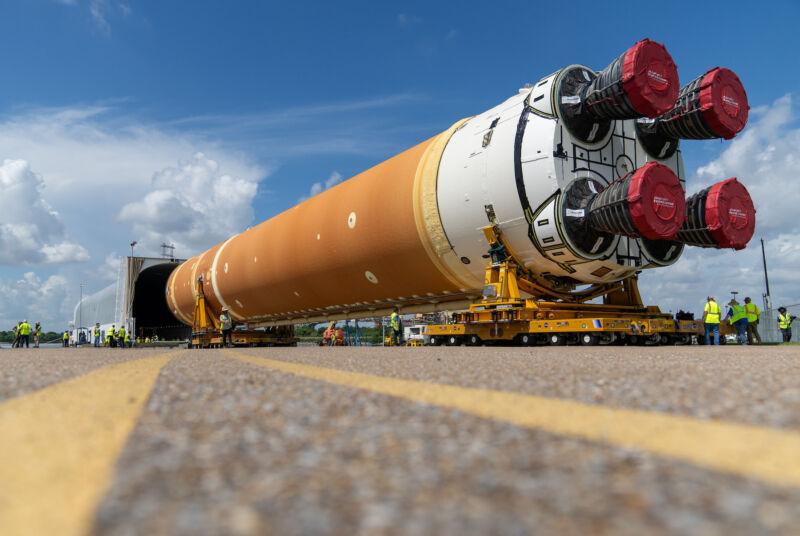Vaya con dios —
Rocket Factory Augsburg completed qualification of its upper stage for a first launch this year.

Enlarge / The core stage for NASA’s second Space Launch System rocket rolls aboard a barge that will take it from New Orleans to Kennedy Space Center in Florida.
Welcome to Edition 7.03 of the Rocket Report! One week ago, SpaceX suffered a rare failure of its workhorse Falcon 9 rocket. In fact, it was the first time the latest version of the Falcon 9, known as the Block 5, has ever failed on its prime mission after nearly 300 launches. The world’s launch pads have been silent since the grounding of the Falcon 9 fleet after last week’s failure. This isn’t surprising, but it’s noteworthy. After all, the Falcon 9 has flown more this year than all of the world’s other rockets combined and is fundamental to much of what the world does in space.
As always, we welcome reader submissions. If you don’t want to miss an issue, please subscribe using the box below (the form will not appear on AMP-enabled versions of the site). Each report will include information on small-, medium-, and heavy-lift rockets as well as a quick look ahead at the next three launches on the calendar.

Astra finally goes private, again. A long-simmering deal for Astra’s founders to take the company private has been finalized, the company announced Thursday, capping the rocket launch company’s descent from blank-check darling to delisting in three years, Bloomberg reports. The launch company’s valuation peaked at $3.9 billion in 2021, the year it went public, and was worth about $12.2 million at the end of March, according to data compiled by Bloomberg. Astra’s chief executive officer, Chris Kemp, and chief technology officer, Adam London, founded the company in 2016 with the goal of essentially commoditizing launch services for small satellites. But Astra’s rockets failed to deliver and fell short of orbit five times in seven tries.
Spiraling … Astra’s stock price tanked after the spate of launch failures, drying up its funding spigot as Kemp tried to pivot toward a slightly larger, more reliable rocket. Astra acquired a company named Apollo Fusion in 2021, entering a new business segment to produce electric thrusters for small satellites. But Astra’s launch business faltered, and last November Kemp and London submitted an offer to retake ownership of the company. Astra announced the closure of the take-private deal Thursday, with Kemp and London acquiring the company’s outstanding shares for 50 cents per share in cash, below the stock’s final listing price of 53 cents. “We will now focus all of our attention on a successful launch of Rocket 4, delivering satellite engines to our customers, and building a company of consequence,” Kemp said. (submitted by EllPeaTea and Ken the Bin)
Firefly chief leaves company. Launch startup Firefly Aerospace parted ways with CEO Bill Weber, Payload reports. The announcement of Weber’s departure late Wednesday came two days after Payload reported Firefly was investigating claims of an alleged inappropriate relationship between him and a female employee. “Firefly Aerospace’s Board of Directors announced that Bill Weber is no longer serving as CEO of the company, effective immediately,” the company said in a statement Wednesday night. Peter Schumacher takes over as interim CEO while Firefly searches for a new permanent chief executive. Schumacher was an interim CEO at Firefly before Weber’s hiring in 2022.
Two days and gone … Payload published the first report of Weber’s alleged improper relationship with a female employee Monday. Two days later, Weber was gone. Payload reported an executive brought his concerns about the alleged relationship to Firefly’s board and resigned because he lost confidence in leadership at the company. Citing four current and former employees, Payload reported Firefly’s culture became “chaotic” since Weber took the helm in 2022 after its acquisition by AE Industrial Partners. The Texas-based company achieved some success during Weber’s tenure, with four orbital launches of its Alpha rocket, although two of the flights ended up in lower-than-planned orbits. (submitted by Ken the Bin)
The easiest way to keep up with Eric Berger’s space reporting is to sign up for his newsletter, we’ll collect his stories in your inbox.
Themis hop tests delayed to next year. The initial hop tests of the European Themis reusable booster, developed by ArianeGroup and funded by ESA, won’t start until next year, European Spaceflight reports. The Swedish Space Corporation, which operates the space center in Sweden where Themis will initially fly, confirmed the schedule change. Once ArianeGroup moves on to higher altitude flights, the testing will be moved to the Guiana Space Center. ESA awarded the first development contract for the Themis booster in 2019, and the first hop tests were then scheduled for 2022. Themis’ hops will be similar to SpaceX’s Grasshopper rocket, which performed a series of up-and-down atmospheric test flights before SpaceX started recovering and reusing Falcon 9 boosters.
Fate of Themis … The Themis booster is powered by the methane-fueled Prometheus engine, also funded by ESA. A large European reusable rocket is unlikely to fly until the 2030s, but a subsidiary of ArianeGroup named MaiaSpace is developing a smaller partially reusable two-stage rocket slated to debut as soon as next year. The Maia rocket will use a modified Themis booster as its first stage. “As a result, for MaiaSpace, the continued and rapid development of the Themis program is essential to ensure it can hit its projected target of an inaugural flight of Maia in 2025,” European Spaceflight reports. (submitted by Ken the Bin)